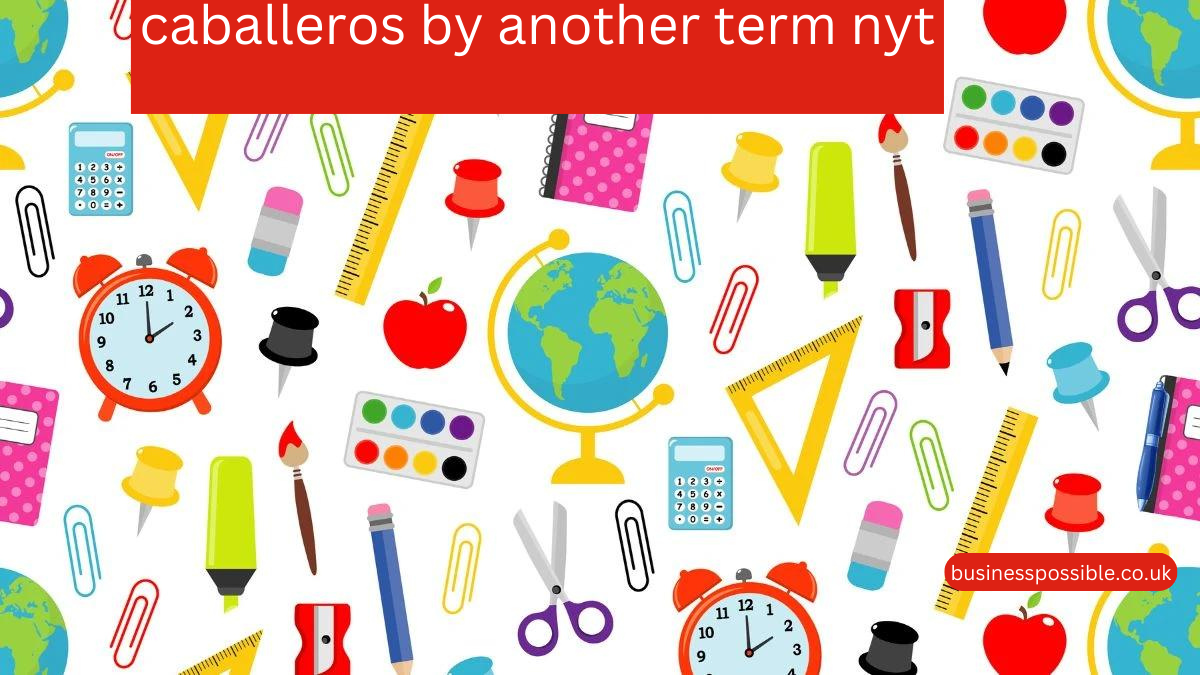Introduction
Have you ever stumbled upon a word and wondered about its various interpretations and uses? The term “caballeros,” which translates to “gentlemen” in English, is one such term. Its usage can vary widely based on context and source. In this article, we’ll delve into how “caballeros” is used in The New York Times (NYT), explore its alternative terms, and understand the broader implications of language in modern journalism.
What Does “Caballeros” Mean?
To fully grasp the nuances of “caballeros,” let’s start with its definition. The term “caballeros” comes from Spanish, where it means “gentlemen” or “knights.” Historically, it referred to individuals of high social standing or those exhibiting chivalrous behavior. In modern contexts, it can also denote a sense of sophistication or courtesy.
The Use of “Caballeros” in Modern Language
In contemporary language, “caballeros” isn’t just a word of the past. It’s used to convey respect and formality. Common synonyms include “gentlemen,” “gentlefolk,” and “knights.” Each synonym carries its own subtle connotations, making word choice crucial depending on the context.
The New York Times and Language Evolution
The New York Times, renowned for its influential journalism, often reflects language trends and shifts. The paper’s coverage of terms like “caballeros” can provide insights into how language evolves and adapts over time. By examining NYT articles, we can see how terms are used and what they signify in various contexts.
When “Caballeros” Appears in NYT Articles
Let’s look at some instances where “caballeros” has appeared in NYT articles. For example, in historical or cultural pieces, it might be used to evoke a sense of nobility or tradition. Analyzing these articles helps us understand the term’s relevance and the reasons behind its usage.
Alternative Terms for “Caballeros” in NYT
NYT often employs synonyms for “caballeros” based on the article’s tone and subject matter. Terms like “gentlemen” or “noblemen” might be used interchangeably. Understanding these alternatives helps in grasping the subtle differences in meaning and connotation.
Exploring Language Trends in NYT
Language trends in NYT can offer a snapshot of broader societal changes. By observing how terms like “caballeros” are used, we can infer shifts in cultural attitudes and values. This reflection of societal norms is vital for understanding the impact of language.
Comparing “Caballeros” with Other Terms
Comparing “caballeros” with similar terms such as “noblemen” or “lords” can reveal nuances in usage. For instance, while “noblemen” might emphasize social rank, “gentlemen” can denote manners and respect. Such distinctions are important for accurate communication.
Why NYT Chooses Specific Terms
The choice of terms in journalism is not arbitrary. NYT selects words to enhance clarity, engagement, and impact. By choosing “caballeros” or its alternatives, the paper aims to connect with readers and convey messages effectively.
Cultural and Regional Variations
Regional dialects and cultural contexts influence term usage. In different Spanish-speaking countries, “caballeros” might carry unique connotations. Understanding these variations helps in appreciating the term’s versatility and richness.
The Impact of Language on Public Perception
Language can shape public perception significantly. Terms like “caballeros” can influence how readers view subjects, whether in historical accounts or contemporary stories. Examining this impact reveals the power of words in media.
Future Trends in Language Use
As language continues to evolve, so will terms like “caballeros.” Future trends might see new synonyms or altered connotations. NYT will likely adapt to these changes, reflecting and shaping the evolving linguistic landscape.
Reader Feedback and Interaction
Reader feedback plays a crucial role in journalism. NYT often considers reader responses to term usage, which can influence future content. Engaging with readers helps ensure that language remains relevant and accurate.
Conclusion
In summary, the term “caballeros” illustrates the complexities of language and its role in journalism. By examining its usage in The New York Times and exploring alternative terms, we gain insights into both linguistic evolution and cultural context. Understanding these aspects enhances our appreciation of how language shapes our world.
FAQs
What does “caballeros” mean in English?
“Caballeros” translates to “gentlemen” or “knights” in English.
How does The New York Times use the term “caballeros”?
The NYT uses “caballeros” in various contexts, including historical and cultural pieces, to convey respect or nobility.
What are some synonyms for “caballeros”?
Synonyms include “gentlemen,” “noblemen,” and “knights.”
Why does NYT choose specific terms like “caballeros”?
NYT selects terms to enhance clarity, engagement, and to reflect the tone of the article.
How can language trends in NYT impact public perception?
Language trends can shape how readers perceive and interpret information, influencing public opinion and understanding.
